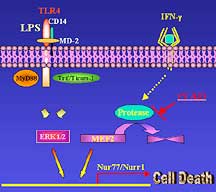On Press:
Research Reveals First Details of Activation-Induced Cell
Death in Macrophages
Programmed cell death, also called apoptosis, plays an important
role in biology because it is a mechanism for getting rid
of cells that are no longer needed. Apoptosis plays a key
role in the immune system, where it is involved in activation-induced
cell death of immune cells—during the selection of T
cells in the thymus and during the development of antigen
tolerance in B cells, for instance. The underlying molecular
mechanisms of programmed cell death in T and B cells have
been extensively studied and described in recent years.
Programmed cell death has been observed in macrophages,
both in vivo and in vitro. However, until recently, scientists
did not understand the process of activation-induced cell
death in macrophages.
Macrophages are one of the key players in the early innate
immune response, and they release inflammatory chemicals known
as cytokines when they are activated. This sort of inflammation
is not always a good thing, and overactive macrophages have
been implicated in a number of human diseases, including arthritis
and sepsis. Activation-induced cell death in macrophages may
present a method of controlling inflammation and avoiding
these conditions.
Now the first details of activation-induced cell death in
macrophages have been described in a paper by a team of researchers
at The Scripps Research Institute (TSRI) led by Research Associate
Sung Ouk Kim and Associate Professor Jiahuai Han.
Kim, Han, and their colleagues provide the first detailed
mechanism of macrophage activation-induced cell death. This
mechanism involves a receptor known as Nur77, which is also
involved in T cell death. Nur77 expression is correlated with
macrophage death, and macrophages deficient in Nur77 show
a significant reduction in cell death.
Significantly, this mechanism seems to work independently
of the protein caspase, which is central to activation-induced
cell death of T cells and B cells. This new Nur77 mechanism
is the first time that an example of activation-induced cell
death has been found without the involvement of caspase.
To read the article "Orphan Nuclear Receptor Nur77 Is Involved
in Caspase-Independent Macrophage Cell Death" by Sung Ouk
Kim, Koh Ono, Peter S. Tobias, and Jiahuai Han, see the June
2, 2003 issue of J. Exp. Med. (197, 1441), or
go to: http://www.jem.org/cgi/doi/10.1084/jem.20021842.

|

The proposed mechanism of activation-induced
macrophage cell death. Click
to enlarge.
|

